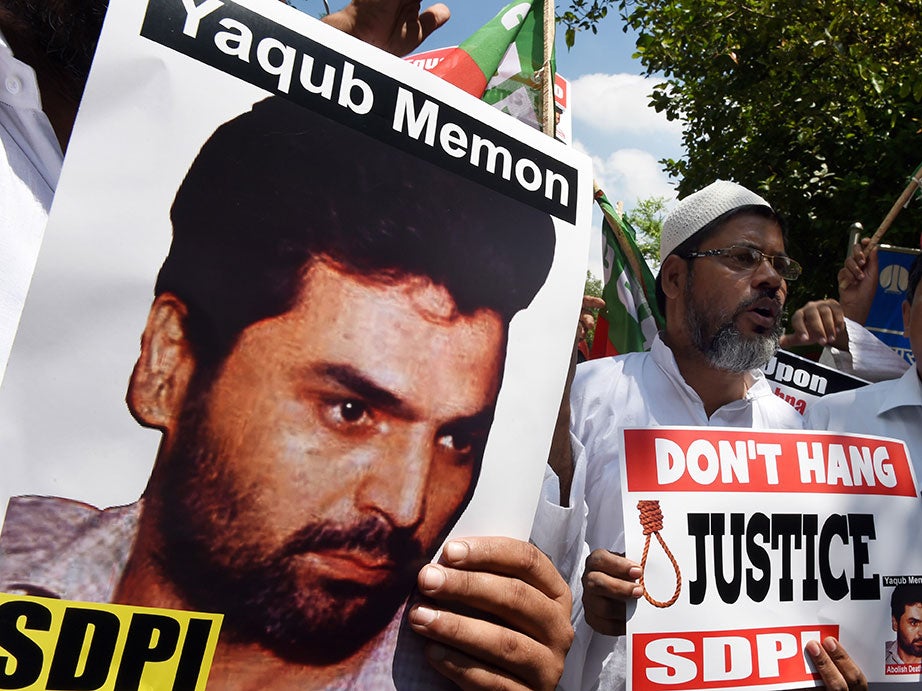Yakub Memon: India executes former accountant for role in Mumbai bombings amid protests against death sentence
Yakub Memon was hanged early Thursday morning in a prison in Nagpur

Your support helps us to tell the story
From reproductive rights to climate change to Big Tech, The Independent is on the ground when the story is developing. Whether it's investigating the financials of Elon Musk's pro-Trump PAC or producing our latest documentary, 'The A Word', which shines a light on the American women fighting for reproductive rights, we know how important it is to parse out the facts from the messaging.
At such a critical moment in US history, we need reporters on the ground. Your donation allows us to keep sending journalists to speak to both sides of the story.
The Independent is trusted by Americans across the entire political spectrum. And unlike many other quality news outlets, we choose not to lock Americans out of our reporting and analysis with paywalls. We believe quality journalism should be available to everyone, paid for by those who can afford it.
Your support makes all the difference.India has executed a man for the role he played in financing the 1993 Mumbai bombings that killed hundreds.
Yakub Memon, 53, was hanged early on Thursday morning at a prison in Nagpur, in the state of Maharashtra, after India’s Supreme Court rejected his final plea.
But the former accountant's death has drawn criticism from human rights groups and has divided the country on the issue of capital punishment. Many protested against his execution in the days leading up to his death.
It recently emerged that with Memon’s help, Indian intelligence were able to establish a link to Pakistan over the bombings, Reuters reported.
But out of 11 people convicted for the bombings, he was the only one to have his death sentence upheld on appeal. The sentences for the others were commuted to life imprisonment.
Few death sentences are carried out in India and only three have occurred for terrorism offences between 2004 and 2012.
Aakar Patel, executive director of Amnesty International India, condemned the execution. "This morning the Indian government essentially killed a man in cold blood to show that killing is wrong."
Meenakshi Ganguly, the South Asia director for Human Rights Watch told Reuters: “It is extremely sad that India has gone ahead, we had been hoping India will now call for a moratorium. But it’s very welcome that now there seems to be a growing debate around this in India."
Memon’s execution, which took place on his 53rd birthday, followed last-minute efforts by his legal team to delay his sentence. After the Supreme Court heard Memon’s final plea, his lawyer Anand Grover told reporters at dawn on Thursday that he had “exhausted” his remedies, AP reported.
“I only hope that Yakub Memon will have a dignified death," he said.
On 12 March 1993, bombs tore through several sites in Mumbai – then known as Bombay – including the Bombay Stock Exchange.
Killing 257 people and injuring a further 713, the explosions are believed to be revenge for earlier riots in which hundreds of Muslims lost their lives.
Memon was arrested in 1994 and sentenced to death in 2007 after being convicted of providing financial and logistical support for the bombings.
His body will be handed to his family following a post-mortem, the state government confirmed to the BBC.
Memon’s older brother, Ibrahim ‘Tiger’ Memon and Dawood Ibrahim are thought to have masterminded the bombings. They have both fled the country.
The Financial Express reported earlier that Shaina NC of the Bharatiya Janata Party said: "1993 blast victims have been waiting for so many years for this trial. There are conspirators and there are masterminds. We will get to the masterminds, but right now its imperative that this conspirator is hung to death."
She said: "So, it sends a message to the terrorists world over that India is not soft on terror."
Join our commenting forum
Join thought-provoking conversations, follow other Independent readers and see their replies
Comments